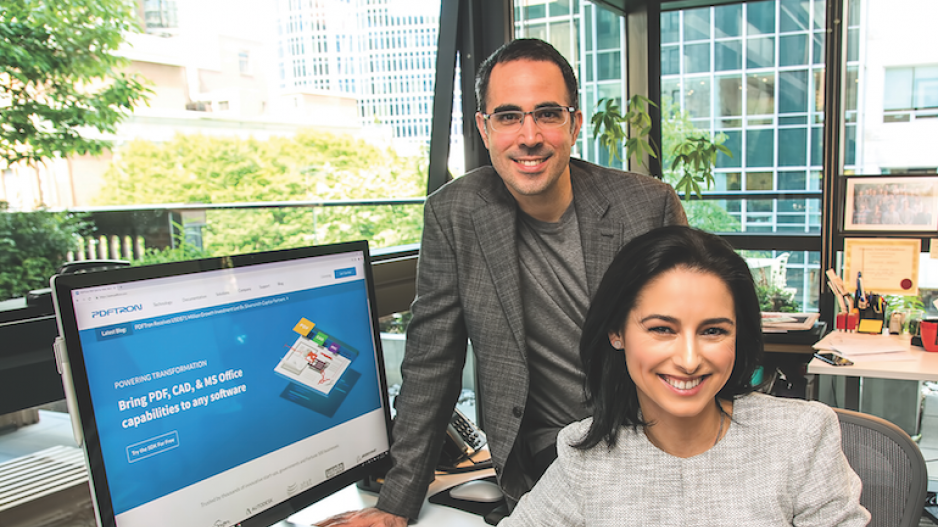All eyes were on Hootsuite Inc. earlier this year when the social media management company confirmed it was laying off an undisclosed number workers.
But the apparent blow to the local tech ecosystem appears to be softened with growth initiatives emerging from lower-profile tech firms.
Vancouver-based PDFTron Systems Inc. revealed recently that Boston-based Silversmith Capital Partners had invested US$71 million in it.
The software firm employs about 45 workers and competes with Adobe Inc. (Nasdaq:ADBE) in the realm of document processing tools.
In addition to expanding the company’s local research and development team, with an eye toward developing artificial intelligence expertise, PDFTron will use the capital for strategic acquisitions internationally, said CEO Catherine Andersz.
“We’ve reached a point where we want to take the company to the next level. At this point we wanted to partner with someone who really understands how to do that, how to expand globally, has a good skill set that’s different from ours.”
The path Andersz has laid out is being followed elsewhere in the local tech sector.
After securing a $50 million investment from Norwest Venture Partners in 2017, Vancouver’s Galvanize Inc. (formerly ACL Services Ltd.) acquired New Jersey-based software firm Rsam in February.
Galvanize employs about 275 workers in B.C. It specializes in auditing and governance, risk management and compliance software.
The Rsam acquisition added several international offices to its global reach and 150 workers to its roster.
“The reality is, after 30-plus years in the market, we offer a capability that is way, way, way beyond audit,” CEO Laurie Schultz told Business in Vancouver.
She said the plan is to take the company public within the next four to five years.
Vancouver-based financial technology firm Progressa raised $84 million in an equity and loan funding round last summer, and CEO Ali Pourdad said at the time he also planned to take the company public.
Fellow fintech Koho Financial Inc., which was founded in Vancouver in 2014, announced in mid-May it had raised $42 million in a Series B funding round.
While Koho moved its headquarters to Toronto in 2017, it maintains an office on the West Coast. And Vancouver’s Elastic Path Software Inc. announced last summer that it had raised $43 million that would allow it to add 50 workers to its 150-person team.
“The ecosystem is maturing,” BC Tech Association CEO Jill Tipping told BIV.
She said the industry’s evolution is allowing tech companies to grow, but the sector still requires more support from policy-makers.
Last year the association issued 11 recommendations to government with the goal of doubling the number of anchor companies in B.C. and increasing access to talent. Recommendations include creating a $1 billion B.C. Transformation Fund over 10 years, establishing a $50 million procurement fund for local companies and updating the refundable scientific research and experimental development tax incentive and the Industrial Research Assistance Program.
“I have a bit of a worry that we don’t take the technology innovation or knowledge economy as seriously in B.C. as people do elsewhere,” Tipping said. “Let’s make sure that we don’t lose interest in people after they finish the R&D and the startup phase.”
BC Tech launched its HyperScale program in February to spur growth at local tech firms.
Its goal is to build companies with annual revenue of $10 million or more into companies generating $50 million or more.
Executives in the program’s first group of companies are receiving a six-month mentorship from other tech executives who’ve scaled up their own firms.
Tipping said response has been positive, and Toronto-based non-profit corporation MaRS Discovery District, which assists with technology commercialization, has reached out for advice on implementing a similar program.
She added that there are plans to help a second group of companies as well as specialized groups that may focus on different technology subsectors or a cohort of female executives.
“I’m really excited by the turning point that I see in B.C.’s ecosystem where we are moving to this major-stage startup [phase],” Tipping said. “We’ve got so much fabulous talent and ideas here; I’d love to see it succeed on a larger scale.”




